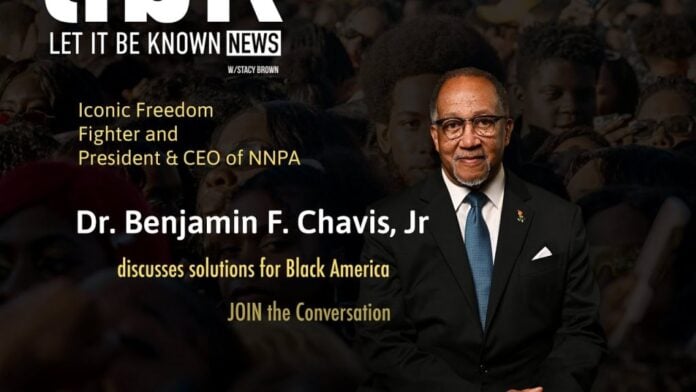
By Stacy M. Brown, NNPA Newswire Senior National Correspondent
Dr. Benjamin F. Chavis Jr., a lifelong civil rights leader and president and CEO of the National Newspaper Publishers Association (NNPA), delivered a call to action during an appearance on the Black Press’ Let It Be Known News Live Morning Show. He focused on the need for unity and mobilization in the fight against systemic racism and oppression. His remarks also highlighted the significance of his latest book, The Transatlantic Slave Trade: Overcoming the 500-Year Legacy, co-authored with NNPA Senior National Correspondent Stacy M. Brown and published by Select Books, Inc.
Public Enemy’s legendary leader Chuck D wrote the book’s forward.
“This book does not simply chronicle history; it challenges readers to face the lasting consequences of the transatlantic slave trade,” Dr. Chavis said. “The blood, sweat, and tears of enslaved Africans laid the very foundation for the American experiment in democracy, yet their descendants are still fighting for equality and justice in every facet of American life.”
The book examines the ongoing impact of slavery’s legacy, from police brutality and mass incarceration to economic disparities and educational inequality. Dr. Chavis, who was unjustly imprisoned as part of the Wilmington Ten, has long fought for equal justice, drawing on his decades of activism to address both historical and modern injustices.
Speaking about the need for immediate action, Dr. Chavis laid out a ten-point plan to confront the challenges facing Black Americans and the African diaspora that have been greatly exacerbated by Donald Trump’s dictatorship-like rule over the United States. “We are not playing,” he said. “We need an action list of what we’re going to do—not what Trump is doing, not what Elon Musk is doing, not what the white supremacists are doing, but what we are doing as righteous people.”
Dr. Chavis said the fight for justice is not limited to African Americans but is a global struggle. “Every inch of progress that Black people have made benefits people all over the world,” he said. “This is Black History Month. Nobody can take that away from us.”
One of the major initiatives he announced includes distributing The Transatlantic Slave Trade to school systems nationwide. “They’re talking about dismantling the Department of Education. We’re talking about erecting a new Department of Education that includes the books of all our heroes and sheroes,” he said. “We should never put the education of our children in the hands of those who want to destroy us.”
Dr. Chavis also spoke on the power of the Black press and the necessity for collective mobilization. On February 7, the Black Press of America will convene a public meeting, bringing publishers, editors, writers, and supporters together. “We’re going to break the Zoom call—we’ll have so many people on it,” he said. “This is about leadership. The public needs this gathering.”
A private meeting of Black leaders will follow on February 8, where strategy discussions will take place away from the eyes of those who seek to divide the movement. “We are not going to tell the people who oppose us what we’re getting ready to do so they can plant seeds of division,” Dr. Chavis said.
Further mobilization efforts will take place on March 2, when thousands are expected to gather in Selma, Alabama, for a reaffirmation of voting rights. “This is not about Democrats or Republicans,” he said. “This is about our fundamental human right to have a way to express ourselves politically, economically, socially, and culturally.”
Dr. Chavis also announced a major event in Memphis, Tennessee, on April 4 to honor Dr. Martin Luther King Jr.’s legacy and strategize the next steps in the civil rights movement. “We are the richest, exploited people in the world,” he said, noting that Black Americans spend nearly $2 trillion annually. “We’re going to have to stop spending with people who do not respect us. We are no longer going to fund apartheid in America.”
A convening with the African Union is also in the works to address global Black unity. “When you attack South Africa, you attack the whole African continent,” he said. “This is not about short-term reactions to executive orders. We need a proactive, long-term engagement strategy.”
In discussing the book, Dr. Chavis pointed to the cover, which features enslaved African women in chains. “It is out of the womb of the African woman that all of civilization came,” he said. “The wealth of Europe and America today comes from the enslavement, genocide, and exploitation of our people.”
He also addressed the importance of reclaiming Black-owned land. “Own some land. Don’t rent it. Buy it,” he said. “Families are leaving thousands of acres of land, and people are not using wills. Don’t let your property stay as our property—make sure there is intergenerational ownership.”

The book has already received support from figures such as NBA legend Isiah Thomas, hip-hop icon Chuck D, and Arikana Chihombori-Quao, the former African Union Ambassador to the United States.
“The chains of slavery may have been broken, but the shackles of systemic racism are still very much intact,” Chuck D wrote in the book’s foreword. “If you’re not angry, you’re not paying attention.”
Dr. Chavis said those who seek to suppress historical truths will not succeed. “This is one book that DeSantis is not going to be able to ban in Florida,” he said. “If you burn it, if you steal it, we’re going to print some more.”



